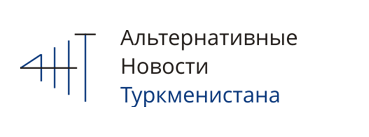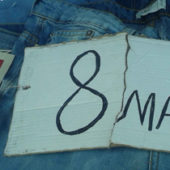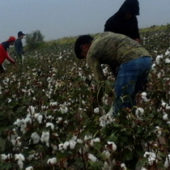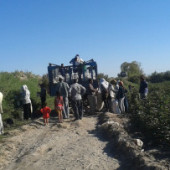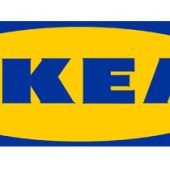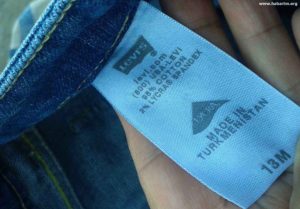 In early September, local bazaars in Turkmenistan suddenly filled with clothing by well-known brands produced from local textile. Levi’s, Zara, Bershka, Pull & Bear, Nautica, Montana, Marc Ecko and other brands are sold straight from wheelbarrows next to piles of carrots, beets and other vegetables. All jeans are labeled «Made in Turkmenistan.»
In early September, local bazaars in Turkmenistan suddenly filled with clothing by well-known brands produced from local textile. Levi’s, Zara, Bershka, Pull & Bear, Nautica, Montana, Marc Ecko and other brands are sold straight from wheelbarrows next to piles of carrots, beets and other vegetables. All jeans are labeled «Made in Turkmenistan.»
All textile products are of the highest quality. All tags were made for Western market, with sizes and care instructions according to Western standards. The apparel was obviously manufactured for export, but never reached the overseas customers, having ended up in the markets of Mary and Turkmenabat. On some products, such as packs of white T-shirts (3 pcs.) by U.S. Polo Assn., Giovanni and Hanes, one will even find the recommended retail price in U.S. dollars — $16 per pack. In Turkmen markets they go for 5 manats per pack ($1-$1.5, depending on the exchange rate).
In Mary, jeans cost three to 10 manats, depending on the brand. They are sold from trucks on the local Lalezar market. Footaction and Silver Star jeans are sold at 10 manats; all sizes are available.
ATN observers in the region say that they have never seen such an abundance of cheap, Turkmenistan-made high-quality denim products before. Previously all quality apparel was intended for export, and the locals had to settle for Turkish-made clothes at a considerably higher price.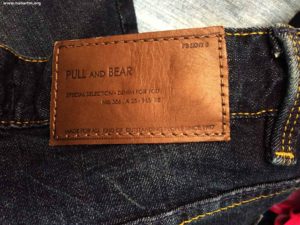
“People are buying this textile in bulk, stocking up for the future, as you can buy these brands nowhere for this money and in this quality. For example, jeans imported by local vendors from Turkey cost between 50 and 100 manats,” source from Mary told ATN.
This massive release of brand clothes in local markets has to do with the refusal of several international companies to buy Turkmen cotton or products made of it because it was harvested using forced labor. In February 2016, H&M, Inditex and VFC confirmed to Swedish journalists that they had stopped working with their supplier in Turkmenistan: Turkmenbashi Jeans Complex. Brands like Zara, Bershka and Pull & Bear belong to Inditex, while VF Corporation owns Nautica.
Most of the brands found in Turkmen markets are owned by the companies that were clients of the same Turkmenbashi Jeans Complex. After last year’s monitoring report by ATN, where we listed all clients of the complex, the information about them was removed from the manufacturer’s website, but ATN saved the screenshots. The rest of the companies did not respond to the Swedish reporters’ question whether they buy Turkmen textiles, so it is hard to say why their products have also ended up on Turkmen markets.
Last spring the U.S. Congress amended the Smoot-Hawley Tariff Act of 1930, known worldwide as the Tariff Act. According to the document, the U.S. Customs must deny access to U.S. seaports to any goods manufactured with the use of forced labor. Perhaps this is the reason why cheap textiles by Levi’s, Footaction, Marc Ecko and Nautica have filled the markets in Turkmenistan. Or, perhaps, the U.S. companies have simply decided not to deal with Turkmenistan, where forced labor is still widely used.
More photos of brands are here.
